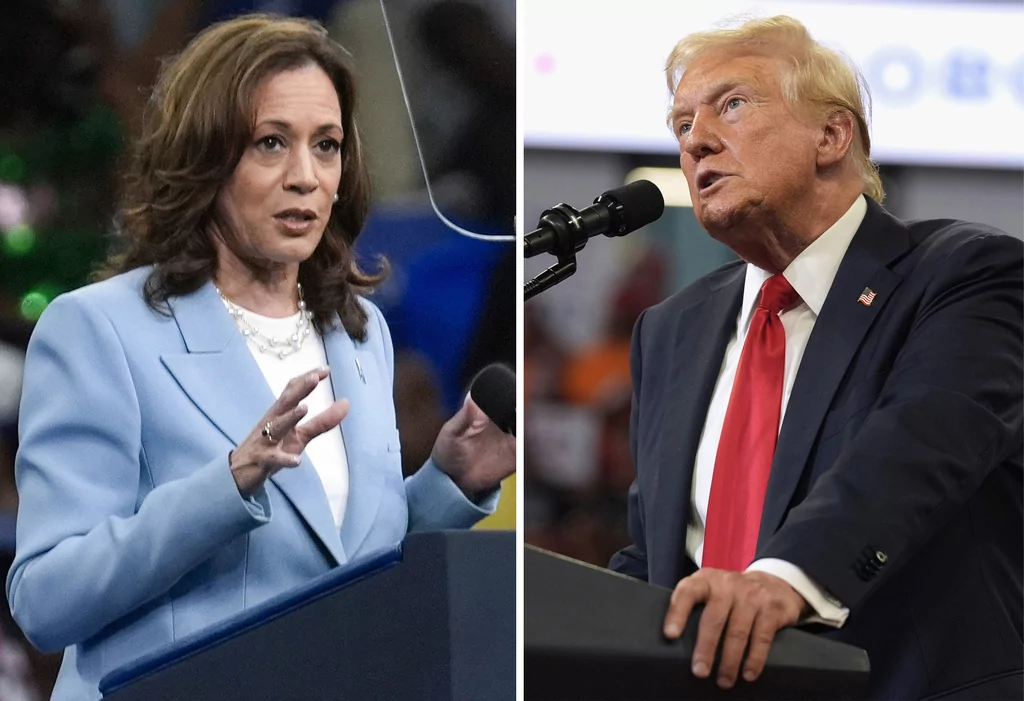

Former President Donald Trump and Vice President Kamala Harris have rarely agreed before and since her inclusion into the presidential race. But several new stances on economic policy from both sides have changed that.
Harris took Trump’s “no tax on tips” pledge, and both candidates now agree on significant child tax credits. Their economic policies serve to feed a voter population hungry for good financial news amid inflation that has hit prime consumer goods hard.
Former President Bill Clinton signed the first child tax credit into law in 1997, and President Joe Biden’s administration expanded it as part of his American Rescue Plan. Senate Republicans recently blocked a chance at expanding the credit as part of a bipartisan tax deal, but that hasn’t stopped Trump from thinking about an expanded $5,000 child tax credit for all income levels.
Trump’s running mate, Sen. J.D. Vance (R-OH), endorsed the idea last week. Harris supports a similar $6,000 credit for newborns, which would triple the current credit allowed.
Harris backed Trump’s “no tax on tips” policy in an Aug. 10 speech in Las Vegas, Nevada, a critical voting area with hospitality and service workers who could benefit. Harris also mentioned raising the minimum wage, which Trump hasn’t.
Trump’s economic promises could ring louder, given Harris is still technically the incumbent. In theory, Harris could push for her economic policies now but hasn’t.
Republicans have seized on those points. While Harris laments rising inflation that has skyrocketed prices of food and other goods, Republicans are crediting her as responsibility for the economic crisis she rails against.
“Kamala Harris is claiming she will fix the economy if she is elected President,” Rep. Andy Ogles (R-TN) posted on X. “Why couldn’t she have fixed it while she was in office the last 4 years?”
Rep. Roger Williams (R-TX) used the recent Trump-coined “Kamalanomics” term to redirect responsibility from President Joe Biden’s Bidenomics to her.
“Americans are living paycheck to paycheck under Harris,” Williams posted on X. “Failed Kamalanomics is making it harder for families to buy a home, finance a car, pay off debt, or even cover basic gas and groceries.”
What Democrats can point out in defense is rising wages relative to inflation. According to the Economic Policy Institute, average wages have beat the rise of inflation for the past year. Senate President Pro Tempore Sen. Patty Murray (D-WA) noted that in a recent post.
The nitty-gritty of how each candidate will implement their agreed-upon economic policies will likely be a different story. Historically, Republicans have cut regulations and government spending to free up space for such moves, while Democrats have raised taxes on upper-tier earners.
“If you want to know who a politician cares about, look at who they fight for,” Harris tweeted Friday. “Donald Trump fights for billionaires and large corporations. I will fight to give money back to working and middle-class Americans.”
This will underscore their hardline economic differences, and Harris recently distanced herself further from Trump with her “price controls” idea that many observers have deemed communism.
“If Kamala is elected and implements her Communist Price Caps, there will be famine, starvation, and poverty, the likes of which we have never seen,” Trump said on Truth Social Friday.
And Trump is not the only one upset at her plan. The left-leaning Washington Post editorial board called her plan to go after “price-gouging” industries a “populist gimmick.”
“Never mind that many stores are currently slashing prices in response to renewed consumer bargain hunting,” they wrote. “Ms. Harris says she’ll target companies that make “excessive” profits, whatever that means. (It’s hard to see how groceries, a notoriously low-margin business, would qualify.)”
CLICK HERE TO READ MORE FROM THE WASHINGTON EXAMINER
Economics commentator Catherine Rampell said on CNN that Sens. Bob Casey and Elizabeth Warren’s bill, the Price Gouging Prevention Act, would be a likely template for Harris to enforce a price gouging ban. The bill would allow the Federal Trade Commission to enforce the ban on price gouging, giving them wide authority over the markets.
Rampell said that it was “fully unworkable for the FTC to be deciding how much Kroger charges for eggs in Michigan.” She said they’ve seen the same thing in “Venezuela, Argentina, the Soviet Union” … it leads to shortages.”




